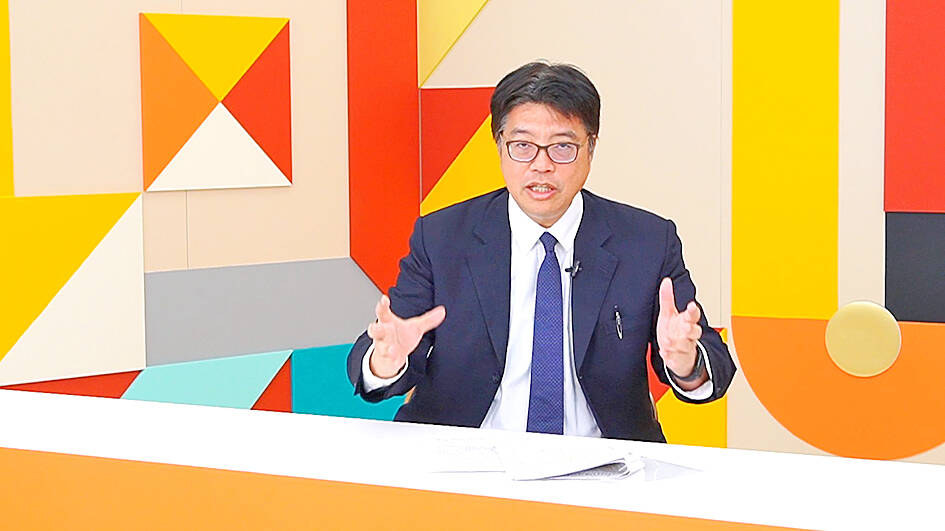China’s intervention in the Chinese Nationalist Party’s (KMT) chairperson election could prove the necessary catalyst for genial collaboration between the ruling and opposition parties to protect against Chinese-sourced fake information campaigns, Mainland Affairs Council (MAC) Minister Chiu Chui-cheng (邱垂正) said.
Chiu made the remarks in an interview with the Chinese-language Liberty Times (the sister newspaper of the Taipei Times) published yesterday.
The KMT’s chairperson election is to take place today. Over the past weeks, several candidates in the KMT leadership race have said that China has been meddling in the election campaign.

Photo: Huang Chun-hsuan, Taipei Times
Chiu in the interview urged a consensus between the ruling and opposition parties to implement legislation to effectively combat disinformation from China and prevent it from endangering Taiwan’s democratic way of life.
China’s “united front” tactics are very flexible, Chiu said, citing how it previously played the KMT against the Democratic Progressive Party (DPP), and is now creating similar distinctions within the KMT by potentially supporting specific candidates and attacking others.
The creation of China-friendly, pro-local, pro-unification and pro-democracy factions within the KMT is a classic divide-and-conquer tactic employed by the Chinese Communist Party (CCP), he said.
In past elections, a torrent of information or controversies originating in China has sought to change the Taiwanese public’s perceptions and sway their voting, and such fake information has often led to conflict within Taiwan and affected its democracy, Chiu said, adding that the government must take the lead in exposing such acts.
“It is very good” the KMT is now calling for measures to bolster democracy, as any effort to amend the National Security Act (國安法) and the Anti-infiltration Act (反滲透法) and shore up Taiwan’s legislation regarding the prevention of foreign infiltration or intervention in the nation should be bipartisan instead of unilateral, he said.
Chiu urged the ruling and opposition parties to work together to deter the flood of Chinese “united front” rhetoric against Taiwan via fake messages and deepfake videos distributed through dummy social media accounts.
Democratic Taiwan’s open access to information makes it more vulnerable to being manipulated by artificial intelligence-generated fake news and deepfake videos on the Internet, while authoritarian China’s centrally controlled access to the Internet and distribution of news means its people are less affected, he said.
China spends very little on spreading false information, while Taiwan spends much more to expose, investigate and verify it, he said.
Chiu suggested that Internet platforms, such as Google, Meta and Line, should take responsibility for combating fake news.
Chiu also said that Taiwan must step up efforts to implement programs to increase media and information literacy so that the public would not be misled when reading about cross-strait news.
Meanwhile, on Hong Kong political analyst Willy Lam’s (林和立) claims that Chinese infiltration of Taiwan is so complete that the “CCP’s united front work organizations can issue direct orders to major KMT lawmakers,” Chiu in the interview said that the MAC leans toward disbelief, but said that the MAC cannot speak for Lam or the KMT.
We believe that anyone who was born and raised here, and has loyalty to the country and its people, and loves the land, would not take orders from Beijing, Chiu said.

A small number of Taiwanese this year lost their citizenship rights after traveling in China and obtaining a one-time Chinese passport to cross the border into Russia, a source said today. The people signed up through Chinese travel agencies for tours of neighboring Russia with companies claiming they could obtain Russian visas and fast-track border clearance, the source said on condition of anonymity. The travelers were actually issued one-time-use Chinese passports, they said. Taiwanese are prohibited from holding a Chinese passport or household registration. If found to have a Chinese ID, they may lose their resident status under Article 9-1

Taiwanese were praised for their composure after a video filmed by Taiwanese tourists capturing the moment a magnitude 7.5 earthquake struck Japan’s Aomori Prefecture went viral on social media. The video shows a hotel room shaking violently amid Monday’s quake, with objects falling to the ground. Two Taiwanese began filming with their mobile phones, while two others held the sides of a TV to prevent it from falling. When the shaking stopped, the pair calmly took down the TV and laid it flat on a tatami mat, the video shows. The video also captured the group talking about the safety of their companions bathing

PROBLEMATIC APP: Citing more than 1,000 fraud cases, the government is taking the app down for a year, but opposition voices are calling it censorship Chinese Nationalist Party (KMT) Chairwoman Cheng Li-wun (鄭麗文) yesterday decried a government plan to suspend access to Chinese social media platform Xiaohongshu (小紅書) for one year as censorship, while the Presidential Office backed the plan. The Ministry of the Interior on Thursday cited security risks and accusations that the Instagram-like app, known as Rednote in English, had figured in more than 1,700 fraud cases since last year. The company, which has about 3 million users in Taiwan, has not yet responded to requests for comment. “Many people online are already asking ‘How to climb over the firewall to access Xiaohongshu,’” Cheng posted on

A classified Pentagon-produced, multiyear assessment — the Overmatch brief — highlighted unreported Chinese capabilities to destroy US military assets and identified US supply chain choke points, painting a disturbing picture of waning US military might, a New York Times editorial published on Monday said. US Secretary of Defense Pete Hegseth’s comments in November last year that “we lose every time” in Pentagon-conducted war games pitting the US against China further highlighted the uncertainty about the US’ capability to intervene in the event of a Chinese invasion of Taiwan. “It shows the Pentagon’s overreliance on expensive, vulnerable weapons as adversaries field cheap, technologically